Dore Bible Gallery, Vol. 3
But the Philistines took him, and put out his eyes, and brought him down to Gaza, and bound him with fetters of brass; and he did grind in the prison house.
Howbeit the hair of his head began to grow again after he was shaven.
Then the lords of the Philistines gathered them together for to offer a great sacrifice unto Dagon their god, and to rejoice: for they said, Our God hath delivered Samson our enemy into our hand. And when the people saw him, they praised their god: for they said, Our god hath delivered into our hands our enemy, and the destroyer of our country, which slew many of us. And it came to pass, when their hearts were merry, that they said, Call for Samson, that he may make us sport. And they called for Samson out of the prison house; and he made them sport: and they set him between the pillars. And Samson said unto the lad that held him by the hand, Suffer me that I may feel the pillars whereupon the house standeth, that I may lean upon them. Now the house was full of men and women; and all the lords of the Philistines were there; and there were upon the roof about three thousand men and women, that beheld while Samson made sport.
And Samson called unto the Lord, and said, O Lord God, remember me, I pray thee, and strengthen me, I pray thee, only this once, O God, that I may be at once avenged of the Philistines for my two eyes. And Samson took hold of the two middle pillars upon which the house stood, and on which it was borne up, of the one with his right hand, and of the other with his left. And Samson said, Let me die with the Philistines. And he bowed himself with all his might; and the house fell upon the lords, and upon all the people that were therein. So the dead which he slew at his http://www.gutenberg.org/files/8710/8710-h/p3.htm[28/04/11 08:33:56 ]
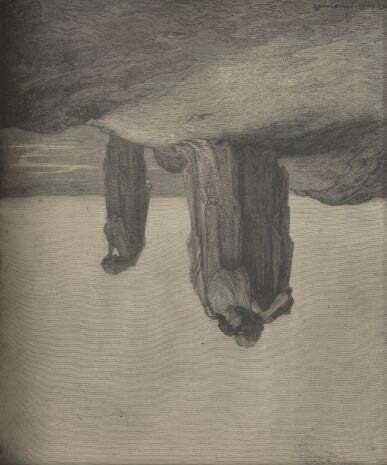
Dore Bible Gallery, Vol. 3
death were more than they which he slew in his life.
Then his brethren and all the house of his father came down, and took him, and brought him up, and buried him between Zorah and Eshtaol in the burying-place of Manoah his father. And he judged Israel twenty years.—Judges xvi; 21-31
NAOMI AND HER DAUGHTERS IN LAW.
Now it came to pass in the days when the judges ruled, that there was a famine in the land. And a certain man of Beth-lehem-judah went to sojourn in the country of Moab, he, and his wife, and his two sons. And the name of the man was Elimelech, and the name of his wife Naomi, and the name of his two sons Mahlon and Chilion, Ephrathites of Beth-lehem-judah. And they came into the country of Moab, and continued there. And Elimelech Naomi's husband died; and she was left, and her two sons. And they took them wives of the women of Moab; the name of the one was Orpah, and the name of the other Ruth: and they dwelt there about ten years. And Mahlon and Chilion died also both of them; and the woman was left of her two sons and her husband.
http://www.gutenberg.org/files/8710/8710-h/p3.htm[28/04/11 08:33:56 ]
Dore Bible Gallery, Vol. 3
Then she arose with her daughters in law, that she might return from the country of Moab for she had heard in the country of Moab how that the Lord had visited his people in giving them bread. Wherefore she went forth out of the place where she was, and her two daughters in law with her; and they went on the way to return unto the land of Judah.
And Naomi said unto her two daughters in law, Go, return each to her mother's house the Lord deal kindly with you, as ye have dealt with the dead, and with me.
The Lord grant you that ye may find rest, each of you in the house of her husband.
Then she kissed them; and they lifted up their voice, and wept. And they said unto her, Surely we will return with thee unto thy people.
And Naomi said, Turn again, my daughters: why will ye go with me? are there yet any more sons in my womb, that they may be your husbands? Turn again, my daughters, go your way; for I am too old to have a husband. If I should say, I have hope, if I should have a husband also to night, and should also bear sons; would ye tarry for them till they were grown? would ye stay for them from having husbands?
nay, my daughters; for it grieveth me much for your sakes that the hand of the Lord is gone out against me.
And they lifted up their voice, and wept again: and Orpah kissed her mother in law but Ruth cleave unto her.
And she said, Behold, thy sister in law is gone back unto her people, and unto her gods return thou after thy sister in law.
And Ruth said, Entreat me not to leave thee, or to return from following after thee: for whither thou goest, I will go; and where thou lodgest, I will lodge: thy people shall be my people, and thy God my God: Where thou diest, will I die, and there will I be buried: the Lord do so to me, and more also, if ought but death part thee and me.
When she saw that she was steadfastly minded to go with her, then she left speaking unto her.
So they two went until they came to Beth-lehem.—Ruth i, 1-19.
RUTH AND BOAZ.
http://www.gutenberg.org/files/8710/8710-h/p3.htm[28/04/11 08:33:56 ]
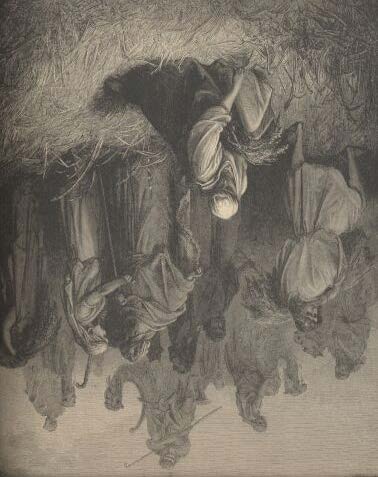
Dore Bible Gallery, Vol. 3
And Naomi had a kinsman of her husband's, a mighty man of wealth, of the family of Elimelech; and his name was Boaz.
And Ruth the Moabitess said unto Naomi, Let me now go to the field, and glean ears of corn after him in whose sight I shall find grace. And she said unto her, Go, my daughter. And she went, and came and gleaned in the field after the reapers; and her hap was to light on a part of the field belonging unto Boaz, who was of the kindred of Elimelech.
And, behold, Boaz came from Bethlehem, and said unto the reapers, The Lord be with you. And they answered him, The Lord bless thee. Then said Boaz unto his servant that was set over the reapers, Whose damsel is this? And the servant that was set over the reapers answered and said, It is the Moabitish damsel that came back with Naomi out of the country of Moab: and she said, I pray you, let me glean and gather after the reapers among the sheaves: so she came, and hath continued even from the morning until now, that she tarried a little in the house.
Then said Boaz unto Ruth, Hearest thou not, my daughter? Go not to glean in another field, neither go from hence, but abide here fast by my maidens: let thine eyes be on the field that they do reap, and go thou after them: have I not charged the young men that they shall not touch thee? and when thou art athirst, go unto the vessels, and drink of that which the young men have drawn.
Then she fell on her face and bowed herself to the ground, and said unto him, Why have I found grace in thine eyes, that thou shouldest take knowledge of me, seeing I am a stranger?
http://www.gutenberg.org/files/8710/8710-h/p3.htm[28/04/11 08:33:56 ]
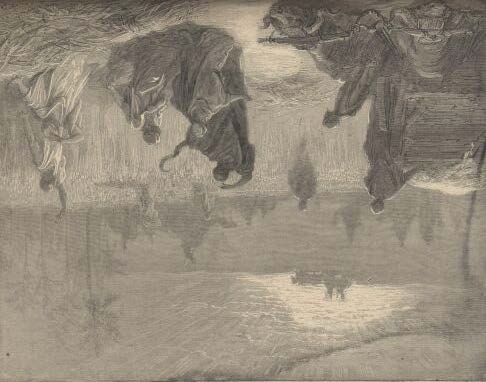
Dore Bible Gallery, Vol. 3
And Boaz answered and said unto her, It hath fully been shewed me, all that thou hast done unto thy mother in law since the death of thine husband: and how thou hast left thy father and thy mother, and the land of thy nativity, and art come unto a people which thou knewest not heretofore. The Lord recompense thy work, and a full reward be given thee of the Lord God of Israel, under whose wings thou art come to trust.
Then she said, Let me find favor in thy sight, my lord; for that thou hast comforted me, and for that thou hast spoken friendly unto thine handmaid, though I be not like unto one of thine handmaidens.
And Boaz said unto her, At mealtime come thou hither, and eat of the bread, and dip thy morsel in the vinegar. And she sat beside the reapers: and he reached her parched corn, and she did eat, and was sufficed, and left. And when she was risen up to glean, Boaz commanded his young men, saying, Let her glean even among the sheaves, and reproach her not: and let fall also some of the handfuls of purpose for her, and leave them, that she may glean them and rebuke her not.
So she gleaned in the field until even, and beat out that she had gleaned: and it was about an ephah of barley.—Ruth ii. 1-17,
THE RETURN OF THE ARK.
http://www.gutenberg.org/files/8710/8710-h/p3.htm[28/04/11 08:33:56 ]
Dore Bible Gallery, Vol. 3
And the ark of the Lord was in the country of the Philistines seven months. And the Philistines called for the priests and the diviners, saying, What shall we do to the ark of the Lord? tell us wherewith we shall send it to his place. And they said, If ye send away the ark of the God of Israel, send it not empty; but in any wise return him a trespass offering: then ye shall be healed, and it shall be known to you why his hand is not removed from you. Then said they, What shall be the trespass offering which we shall return to him? They answered, Five golden emerods, and five golden mice, according to the number of the lords of the Philistines: for one plague was on you all, and on your lords. Wherefore ye shall make images of your emerods, and images of your mice that mar the land; and ye shall give glory unto the God of Israel: peradventure he will lighten his hand from off you, and from off your gods, and from off your land. Wherefore then do ye harden your hearts, as the Egyptians and Pharaoh hardened their hearts? when he had wrought wonderfully among them, did they not let the people go, and they departed? Now therefore make a new cart, and take two milch kine, on which there hath come no yoke, and tie the kine to the cart, and bring their calves home from them: and take the ark of the Lord, and lay it upon the cart; and put the jewels of gold, which ye return him for a trespass offering, in a coffer by the side thereof; and send it away, that it may go. And see, if it goeth up by the way of his own coast to Beth-shemesh, then he hath done us this great evil: but if not, then we shall know that it is not his hand that smote us; it was a chance that happened to us.
And the men did so; and took two milch kine, and tied them to the cart, and shut up their calves at home: and they laid the ark of the Lord upon the cart, and the coffer with the mice of gold and the images of their emerods. And the kine took the straight way to the way of Beth-shemesh, and went along the highway, lowing as they went, and turned not aside to the right hand or to the left; and the lords of the Philistines went after them, unto the border of Beth-shemesh. And they of Beth-shemesh were reaping their wheat harvest in the valley: and they lifted up their eyes, and saw the ark, and rejoiced to see it. And the cart came into the field of Joshua, a Beth-shemite, and stood there, where there was a great stone: and they clave the wood of the cart, and offered the kine a burnt offering unto the Lord.
And the Levites took down the ark of the Lord, and the coffer that was with it, wherein the jewels of gold were, and put them on the great stone: and the men of Beth-shemesh offered burnt offerings and sacrificed sacrifices the same day unto the Lord.—1 Samuel vi, 1-5.
SAUL AND DAVID.
http://www.gutenberg.org/files/8710/8710-h/p3.htm[28/04/11 08:33:56 ]
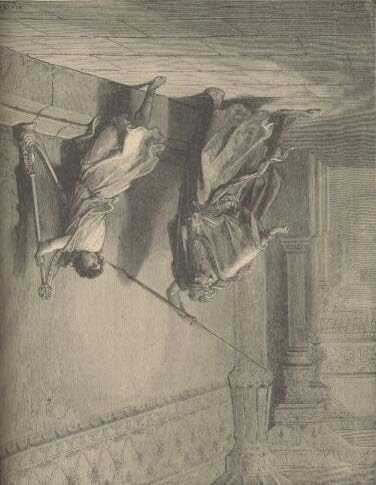
Dore Bible Gallery, Vol. 3
And it came to pass, when he had made an end of speaking unto Saul, that the soul of Jonathan was knit with the soul of David, and Jonathan loved him as his own soul. And Saul took him that day, and would let him go no more home to his father's house.
Then Jonathan and David made a covenant, because he loved him as his own soul.
And Jonathan stripped himself of the robe that was upon him, and gave it to David, and his garments, even to his sword, and to his bow, and to his girdle.
And David went out withersoever Saul sent him, and behaved himself wisely: and Saul set him over the men of war, and he was accepted in the sight of all the people, and also in the sight of Saul's servants.
And it came to pass as they came, when David was returned from the slaughter of the Philistine, that the women came out of all cities of Israel, singing and dancing, to meet king Saul, with tabrets, with joy, and with instruments of music. And the women answered one another as they played, and said, Saul hath slain his thousands, and David his ten thousands.
And Saul was very wroth, and the saying displeased him; and he said, "They have ascribed unto David ten thousands, and to me they have ascribed but thousands: and what can he have more but the kingdom?" And Saul eyed David from that day and forward.
And it came to pass on the morrow, that the evil spirit from God came upon Saul, and he prophesied in the midst of the house: and David played with his hand, as at http://www.gutenberg.org/files/8710/8710-h/p3.htm[28/04/11 08:33:56 ]
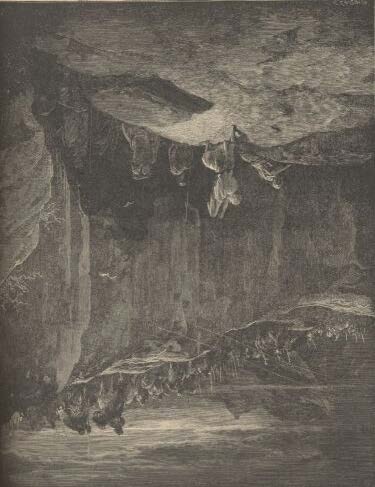
Dore Bible Gallery, Vol. 3
other times: and there was a javelin in Saul's hand. And Saul cast the javelin; for he said, I will smite David even to the wall with it. And David avoided out of his presence twice.—1 Samuel xviii, I-II.
DAVID SPARING SAUL.
And it came to pass, when Saul was returned from following the Philistines, that it was told him, saying, Behold, David is in the wilderness of Engedi. Then Saul took three thousand chosen men out of all Israel, and went to seek David and his men upon the rocks of the wild goats. And he came to the sheepcotes by the way, where was a cave; and Saul went in to cover his feet: and David and his men remained in the sides of the cave.
And the men of David said unto him, Behold the day of which the Lord said unto thee, Behold, I will deliver thine enemy into thine hand, that thou mayest do to him as it shall seem good unto thee. Then David arose, and cut off the skirt of Saul's robe privily. And it came to pass afterward, that David's heart smote him, because he had http://www.gutenberg.org/files/8710/8710-h/p3.htm[28/04/11 08:33:56 ]
Dore Bible Gallery, Vol. 3
cut off Saul's skirt. And he said unto his men, The Lord forbid that I should do this thing unto my master, the Lord's anointed, to stretch forth mine hand against him, seeing he is the anointed of the Lord.
So David stayed his servants with these words, and suffered them not to rise against Saul. But Saul rose up out of the cave, and went on his way. David also arose afterward, and went out of the cave, and cried after Saul, saying, My lord the king. And when Saul looked behind him, David stooped with his face to the earth and bowed himself.
And David said to Saul, Wherefore hearest thou men's words, saying, Behold, David seeketh thy hurt? Behold, this day thine eyes have seen how that the Lord had delivered thee to-day into mine hand in the cave: and some bade me kill thee; but mine eye spared thee; and I said, I will not put forth mine hand against my lord; for he is the Lord's anointed. Moreover, my father, see, yea, see the skirt of thy robe in my hand: for in that I cut off the skirt of thy robe, and killed thee not, know thou and see that there is neither evil nor transgression in mine hand, and I have not sinned against thee; yet thou huntest my soul to take it. The Lord judge between me and thee, and the Lord avenge me of thee: but mine hand shall not be upon thee. As saith the proverb of the ancients, Wickedness proceedeth from the wicked: but mine hand shall not be upon thee. After whom is the king of Israel come out? after whom dost thou pursue? after a dead dog, after a flea. The Lord therefore be judge, and judge between me and thee, and see, and plead my cause, and deliver me out of thine hand.
And it came to pass, when David had made an end of speaking these words unto Saul, that Saul said, Is this thy voice, my son David? And Saul lifted up his voice, and wept. And he said to David, Thou art more righteous than I: for thou hast rewarded me good, whereas I have rewarded thee evil. And thou hast shewed this day how that thou hast dealt well, with me: forasmuch as when the Lord had delivered me into thine hand, thou killedst me not. For if a man find his enemy, will he let him go well away? wherefore the Lord reward thee good for that thou hast done unto me this day. And now, behold, I know well that thou shalt surely be king, and that the kingdom of Israel shall be established in thine hand. Swear now therefore unto me by the Lord, that thou wilt not cut off my seed after me, and that thou wilt not destroy my name out of my father's house.
And David sware unto Saul. And Saul went home; but David and his men gat them up unto the hold.—2 Samuel xxiv, 2—22.
Previous Part Main Index Next Part
http://www.gutenberg.org/files/8710/8710-h/p3.htm[28/04/11 08:33:56 ]
Dore Bible Gallery, Vol. 4
Previous Part Main Index Next Part
THE DORE GALLERY OF BIBLE
ILLUSTRATIONS
By Gustave Dore
Volume 4.
With a click all images will expand to their full size http://www.gutenberg.org/files/8710/8710-h/p4.htm[28/04/11 08:34:35 ]
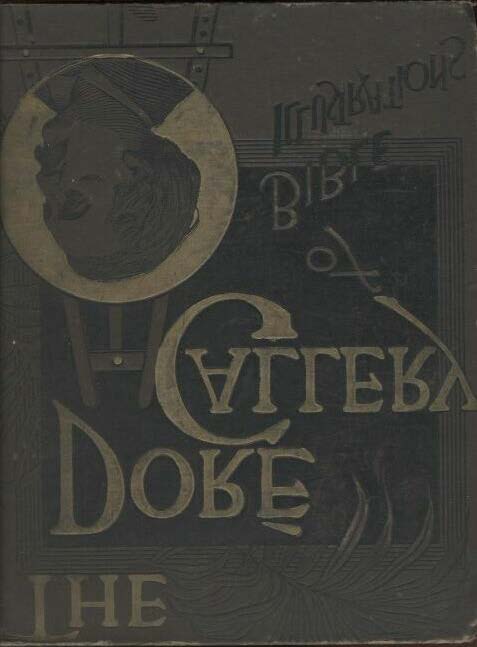
Dore Bible Gallery, Vol. 4
http://www.gutenberg.org/files/8710/8710-h/p4.htm[28/04/11 08:34:35 ]
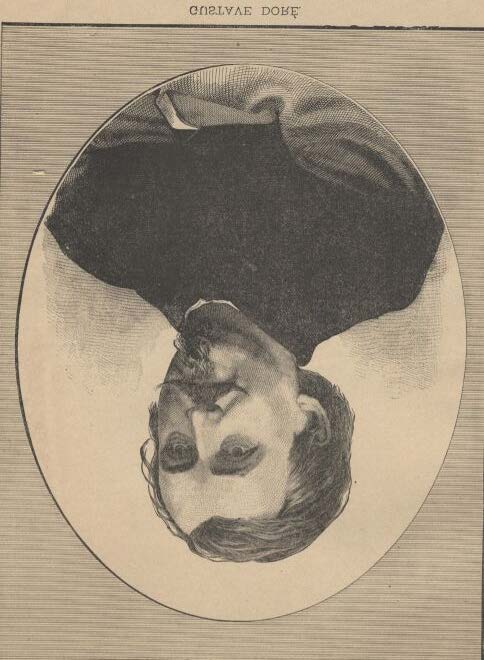
Dore Bible Gallery, Vol. 4
http://www.gutenberg.org/files/8710/8710-h/p4.htm[28/04/11 08:34:35 ]
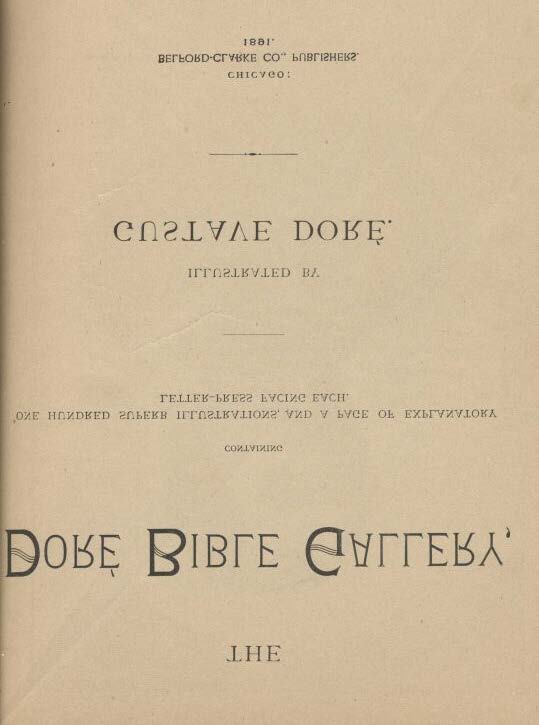
Dore Bible Gallery, Vol. 4
This volume, as its title indicates, is a collection of engravings illustrative of the Bible—the designs being all from the pencil of the greatest of modern delineators, Gustave Dore. The original work, from which this collection has been made, met with an immediate and warm recognition and acceptance among those whose means admitted of its purchase, and its popularity has in no wise diminished since its first publication, but has even extended to those who could only enjoy it casually, or in fragmentary parts. That work, however, in its entirety, was far too costly for the larger and ever-widening circle of M. Dore's admirers, and to meet the felt and http://www.gutenberg.org/files/8710/8710-h/p4.htm[28/04/11 08:34:35 ]
Dore Bible Gallery, Vol. 4
often-expressed want of this class, and to provide a volume of choice and valuable designs upon sacred subjects for art-loving Biblical students generally, this work was projected and has been carried forward. The aim has been to introduce subjects of general interest—that is, those relating to the most prominent events and personages of Scripture—those most familiar to all readers; the plates being chosen with special reference to the known taste of the American people. To each cut is prefixed a page of letter-press—in, narrative form, and containing generally a brief analysis of the design. Aside from the labors of the editor and publishers, the work, while in progress, was under the pains-taking and careful scrutiny of artists and scholars not directly interested in the undertaking, but still having a generous solicitude for its success. It is hoped, therefore, that its general plan and execution will render it acceptable both to the appreciative and friendly patrons of the great artist, and to those who would wish to possess such a work solely as a choice collection of illustrations upon sacred themes.
GUSTAVE DORE.
The subject of this sketch is, perhaps, the most original and variously gifted designer the world has ever known. At an age when most men have scarcely passed their novitiate in art, and are still under the direction and discipline of their masters and the schools, he had won a brilliant reputation, and readers and scholars everywhere were gazing on his work with ever-increasing wonder and delight at his fine fancy and multifarious gifts. He has raised illustrative art to a dignity and importance before unknown, and has developed capacities for the pencil before unsuspected. He has laid all subjects tribute to his genius, explored and embellished fields hitherto lying waste, and opened new and shining paths and vistas where none before had trod. To the works of the great he has added the lustre of his genius, bringing their beauties into clearer view and warming them to a fuller life.
His delineations of character, in the different phases of life, from the horrible to the grotesque, the grand to the comic, attest the versatility of his powers; and, whatever faults may be found by critics, the public will heartily render their quota of admiration to his magic touch, his rich and facile rendering of almost every thought that stirs, or lies yet dormant, in the human heart. It is useless to attempt a sketch of his various beauties; those who would know them best must seek them in the treasure
—house that his genius is constantly augmenting with fresh gems and wealth. To one, however, of his most prominent traits we will refer—his wonderful rendering of the powers of Nature.
His early wanderings in the wild and romantic passes of the Vosges doubtless developed this inherent tendency of his mind. There he wandered, and there, mayhap, imbibed that deep delight of wood and valley, mountain—pass and rich ravine, whose variety of form and detail seems endless to the enchanted eye. He has caught the very spell of the wilderness; she has laid her hand upon him, and he has gone forth with her blessing. So bold and truthful and minute are his countless representations of forest scenery; so delicate the tracery of branch and stem; so http://www.gutenberg.org/files/8710/8710-h/p4.htm[28/04/11 08:34:35 ]
Dore Bible Gallery, Vol. 4
patriarchal the giant boles of his woodland monarchs, that the' gazer is at once satisfied and entranced. His vistas lie slumbering with repose either in shadowy glade or fell ravine, either with glint of lake or the glad, long course of some rejoicing stream, and above all, supreme in a beauty all its own, he spreads a canopy of peerless sky, or a wilderness, perhaps, of angry storm, or peaceful stretches of soft, fleecy cloud, or heavens serene and fair—another kingdom to his teeming art, after the earth has rendered all her gifts.
Paul Gustave Dore was born in the city of Strasburg, January 10, 1833. Of his boyhood we have no very particular account. At eleven years of age, however, he essayed his first artistic creation—a set' of lithographs, published in his native city.
The following year found him in Paris, entered as a 7. student at the Charlemagne Lyceum. His first actual work began in 1848, when his fine series of sketches, the
"Labors of Hercules," was given to the public through the medium of an illustrated, journal with which he was for a long time connected as designer. In 1856 were published the illustrations for Balzac's "Contes Drolatiques" and those for "The Wandering Jew "—the first humorous and grotesque in the highest degree—indeed, showing a perfect abandonment to fancy; the other weird and supernatural, with fierce battles, shipwrecks, turbulent mobs, and nature in her most forbidding and terrible aspects. Every incident or suggestion that could possibly make the story more effective, or add to the horror of the scenes was seized upon and portrayed with wonderful power. These at once gave the young designer a great reputation, which was still more enhanced by his subsequent works.
With all his love for nature and his power of interpreting her in her varying moods, Dore was a dreamer, and many of his finest achievements were in the realm of the imagination. But he was at home in the actual world also, as witness his designs for
"Atala," "London—a Pilgrimage," and many of the scenes in "Don Quixote."
When account is taken of the variety of his designs, and the fact considered that in almost every task he attempted none had ventured before him, the amount of work he accomplished is fairly incredible. To enumerate the immense tasks he undertook
—some single volumes alone containing hundreds of illustrations—will give some faint idea of his industry. Besides those already mentioned are Montaigne, Dante, the Bible, Milton, Rabelais, Tennyson's "Idyls of the King," "The Ancient Mariner, Shakespeare, "Legende de Croquemitaine," La Fontaine's "Fables," and others still.
Take one of these works—the Dante, La Fontaine, or "Don Quixote"—and glance at the pictures. The mere hand labor involved in their production is surprising; but when the quality of the work is properly estimated, what he accomplished seems prodigious. No particular mention need be made of him as painter or sculptor, for his reputation rests solely upon his work as an illustrator.
Dore's nature was exuberant and buoyant, and he was youthful in appearance. He had a passion for music, possessed rare skill as a violinist, and it is assumed that, had he failed to succeed with his pencil, he could have won a brilliant reputation as a musician.
He was a bachelor, and lived a quiet, retired life with his mother—married, as he expressed it, to her and his art. His death occurred on January 23, 1883.
http://www.gutenberg.org/files/8710/8710-h/p4.htm[28/04/11 08:34:35 ]
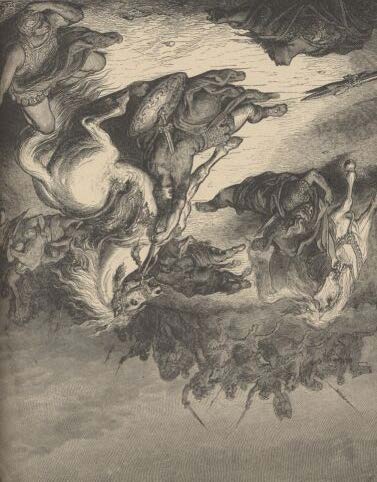
Dore Bible Gallery, Vol. 4
LIST OF ILLUSTRATIONS
GUSTAVE DORE
DEATH OF SAUL
THE DEATH OF ABSALOM
DAVID MOURNING OVER ABSALOM
SOLOMON
THE JUDGMENT OF SOLOMON
THE CEDARS DESTINED FOR THE TEMPLE
THE PROPHET SLAIN BY A LION
ELIJAH DESTROYING THE MESSENGERS OF AHAZIAH
ELIJAH'S ASCENT IN A CHARIOT OF FIRE
DEATH OF JEZEBEL
ESTHER CONFOUNDING HAMAN
DEATH OF SAUL.
http://www.gutenberg.org/files/8710/8710-h/p4.htm[28/04/11 08:34:35 ]
Dore Bible Gallery, Vol. 4
Now the Philistines fought against Israel: and the men of Israel fled from before the Philistines, and fell down slain in mount Gilboa. And the Philistines followed hard upon Saul and upon his sons; and the Philistines slew Jonathan, and Abinadab, and Melchshua, Saul's sons.
And the battle went sore against Saul, and the archers hit him; and he was sore wounded of the archers. Then said Saul unto his armourbearer, Draw thy sword, and thrust me through therewith; lest these uncircumcised come and thrust me through, and abuse me. But his armourbearer would not; for he was sore afraid. Therefore, Saul took a sword, and fell upon it. And when his armourbearer saw that Saul was dead, he fell likewise upon his sword, and died with him.
So Saul died, and his three sons, and his armourbearer, and all his men, that same day together.
And when the men of Israel that were on the other side of the valley, and they that were on the other side Jordan, saw that the men of Israel fled, and that Saul and his sons were dead, they forsook the cities, and fled; and the Philistines came and dwelt in them. And it came to pass on the morrow, when the Philistines came to strip the slain, that they found Saul and his three sons fallen in mount Gilboa. And they cut off his head, and stripped off his armour, and sent into the land of the Philistines round about, to publish it in the house of their idols, and among the people. And they put his armour in the house of Ashtaroth and they fastened his body to the wall of Beth-shan.
And when the inhabitants of Jabesh-gilead heard of that which the Philistines had done to Saul; all the valiant men arose, and went all night, and took the body of Saul and the bodies of his sons from the wall of Beth-shan, and came to Jabesh, and burnt them there. And they took their bones, and buried them under a tree at Jabesh, and fasted seven days. 1 Samuel xxxi.
THE DEATH OF ABSALOM.
http://www.gutenberg.org/files/8710/8710-h/p4.htm[28/04/11 08:34:35 ]
<












